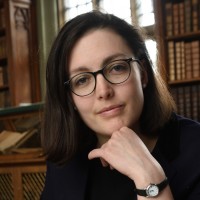Overview
Minimum offer level: A*AA (or equivalent)
Required subjects: None
Useful subjects: History, English Literature, English Language, and a language
Number of undergraduate students admitted per year: Around two
Admissions assessment: None
Submitted work: 2 pieces
"The only undergraduate course that brings together the language and literature and the history of early medieval Britain, Ireland and Scandinavia - and manuscript studies too." -Dr Debby Banham, Former Director of Studies
Anglo-Saxon, Norse & Celtic is a unique degree course focussing on the history, material culture, languages and literature of the peoples of Britain, Ireland and the Scandinavian world in the earlier Middle Ages. Students discover medieval history while learning one or more languages and reading great works of literature in the original languages, such as the Old English poem Beowulf, the epic medieval Irish tale Táin Bó Cúailnge (The Cattle Raid of Cooley) and Icelandic sagas.
The three years ASNC course is divided into two academic phases- Part I and Part II. Part I is completed over the first two years of the course. Students move onto Part II in the third year of their degree.
Part I candidates must complete six papers, or five papers plus a dissertation. There is a wide variety of papers to choose from, including Scandinavian history, Old English and palaeography.
Candidates for Part II must complete and additional four papers and a dissertation.
Further information can be found on the Faculty and University websites.
Typical offers require
- A-Level: A*AA
- IB: 40-42 points, with 776 at Higher level
- Advanced Highers: A1, A2, A2
For other qualifications see the main entrance requirements pages on the University website.
Subject Requirements
A-level
Required: None
Highly recommended: History and any of English Literature, English Language, or a language
IB
Required: None
Highly recommended: Higher Level History and any of Higher Level English (Literature or Language and Literature), or a Higher Level language
Mature students and those taking other qualifications are encouraged to contact our Admissions Office (at admissions@lucy.cam.ac.uk) to discuss the entry requirements for their qualifications.
Written work
You will be required to submit two pieces of written work as part of your application.
Assessments
No assessment is required for this course.
Interviews
Interviews allow us to distinguish amongst excellent applicants by assessing the skills and aptitudes essential for successful study in higher education, and your academic qualities – essentially, how do you think?
Interviews for all applicants to Lucy Cavendish will take place virtually. The aims and content will still be the same as in-person interviews. You can read more about Lucy Cavendish's online interviews here and you can read the University's information on interviews here.
Each candidate typically has two interviews, lasting between twenty and thirty minutes. In some cases, you will be given preparatory material beforehand.
In a few subjects, you will be interviewed by more than one College or in the Faculty. You will be notified of this in your interview invitation.
Supracurricular exploration is an important way to expand your knowledge of your subject, explore your interests and develop your skills. Our new webpage contains guidance on supracurricular exploration and a comprehensive source of resources, grouped according to undergraduate degrees at Cambridge.
Sign-up for our mailing list
We send out monthly newsletters to update you on exciting events and opportunities happening both in Lucy Cavendish College and across the wider university.
Attend an open day or event
Our Events and Open Days page advertises regular events held by Lucy Cavendish College. If you can, join us for a College Open Day to discuss your application with a member of our admissions team.




